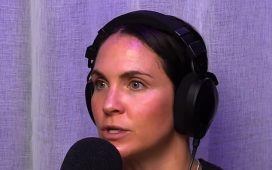People who come to The Goop Lab looking to hate-watch Gwyneth Paltrow will get what they came for. There’s the show’s opening montage, where she makes a cutesy joke about her “calling” in life being “something else besides, y’know, making out with Matt Damon onscreen.” There’s the moment in the first episode when she describes being an object of public vitriol as “inherently traumatic.”
But there’s not all that much of Paltrow in the series’ six episodes. (And, it’s worth noting, when she’s not talking about herself, she’s quite likable: thoroughly engaged with her guests, genuinely curious, asking smart questions. Maybe she was right about her calling.) No, the focus of The Goop Lab is Paltrow’s staff, and the show is all the better for it.
As the title indicates, the series turns Goop, the lifestyle company, into a sort of traveling laboratory. But the Goopers are not the scientists. They’re the guinea pigs. In the name of wellness or what we like to call “self-care” these days, staffers from throughout the Goop infrastructure and hierarchy — from beauty editors to IT guys, assistants to executives — try out a variety of alternative therapies, exercises, workshops, and diets. As a work of journalism investigating these practices, the show fails; 60 Minutes it is not. But reportorial rigor doesn’t seem to be its aim. As a human experiment, a window into conversations going on in certain (usually privileged, usually metropolitan) circles across the country right now, about how to feel better or more in control or more whole amid a broken world, it’s frequently compelling.
Credit for this goes entirely to the Goop squad, a mostly young and diverse group, many of whom are refreshingly open about the personal struggles that bring them to their chosen experiment. Their vulnerability grounds the show and lends it authenticity — which is saying something when the topics we’re exploring are visits to energy healers and psychics. There is nothing about them that hints of fame-seeking or pretense.
In Episode One, which focuses on the use of psychedelics for psychotherapy, you’ll hear people state their goal for a magic mushroom session as a desire to “understand myself in the context of the larger universe” or “find freedom to spread my wings.” (And you’ll hear one of the guiding therapists say that the event should be treated as a sacrament “so we can be one with the spirit of the mushrooms.”) But you’ll also meet Jenny, a photo editor who wants help processing her father’s suicide just a few years earlier, and Paltrow’s longtime assistant Kevin, whose distant father growing up has left him emotionally handicapped in his adult relationships. It’s hard not to be moved by their personal stories, and weirdly grateful that they’ve allowed someone to film their occasionally raw experience tripping, which shows them weeping, shaking, and crying out to the therapists for help.
(There are also interviews with two non-Goopers who use psychedelics for therapy: a veteran grappling with PTSD, who’d attempted suicide five times before beginning assisted MDMA sessions; and a 31-year-old woman who started microdosing psilocybin after her depression progressed to suicidal thinking, and who talks about the challenges of confronting mental health issues in the African American community. Their accounts are a vital break from the Goop-centric perspective that might make it easy to label the whole affair a grand exercise in navel-gazing.)
Episode Two centers on a wintertime trip to Lake Tahoe with the Dutchman Wim Hof, a.k.a. The Iceman, whose regimen of breathing exercises and exposure to extreme cold have been shown to boost the immune system and, he says, can treat depression and anxiety. Goop executive editor Kate, a featherweight woman who practically vibrates with nervous energy, tells Hof that she was diagnosed with a panic disorder after having a baby. She seems trepidatious yet desperately hopeful that his method might help free her from her debilitating condition. She starts to experience symptoms of a panic attack during the group’s very first breathing exercise, but later, when she leaps into the lake’s 38-degree waters using Hof’s mind-over-matter technique, you want to give her a hug.
Perhaps the most powerful episode is the one devoted to women’s sexual health, which aims to reduce the shame women have around their own bodies. In addition to dishing out some upsetting statistics (labiaplasty increased 45 percent worldwide between 2015 and 2016; in one survey of 1,000 women, 60 percent were unable to identify their vulva), it swiftly dispels the Sex and the City-propagated notion that women love nothing more than to sit around with their gal pals talking about sex. Most of the young women at the intimacy workshop admit to never discussing sexual pleasure with anyone — to having absorbed some unspoken cultural rule that it’s not allowed — and to the depressing lack of understanding about themselves that results. “You don’t talk about it with friends, you don’t learn about it in school,” says Heaven, a twentysomething associate product manager who confesses to having body-image issues. “So you grow up thinking it’s something that you keep in, you keep to yourself. In the long run, you don’t end up sharing that with your partner, who you want to experience that with. It just gets closed up.”
The key figure in the episode is Lexi, a Goop accountant who grew up in Shanghai, where talk of sex and sexuality was absolutely taboo. Now an out lesbian, she recognized that she was so uncomfortable receiving pleasure that it was impeding her relationship. So she not only attends the intimacy workshop to learn how to better communicate with a partner; she makes a special visit to the legendary sex educator Betty Dodson in New York, who schools women in self-love and masturbation. (The 90-year-old Dodson, incidentally, is television gold — sassy, brassy, and hilarious. Paltrow: “What happens at your workshops?” Dodson, with a shrug: “Everybody gets off.”) Watching Lexi marshal the confidence to confront the cultural stigmas she grew up with and prioritize her own fulfillment is affirming. Yes, it may be a privilege to devote so much time and energy (and, presumably, money) to individual happiness, but that doesn’t mean it’s easy or unimportant. With the world in the shitter, sometimes the least we can do is take care of ourselves. If we have Gwyneth Paltrow to thank for it, so be it.













